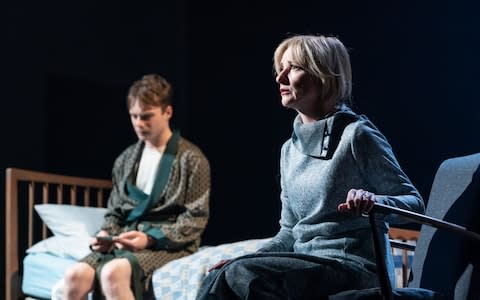Pinter Five and Six review: 'the whole cast are cooking with gas'

When Harold Pinter departed the scene on Christmas Eve, 2008, he left behind a substantial, influential body of work and one awkward question: how long would that work endure?
Thanks to Jamie Lloyd’s ongoing venture to present all 23 of Pinter’s “one-act” pieces, it’s becoming increasingly clear that the Pinter corpus shows reassuringly few signs of decay. Even his most meagre morsels have meat on the bone.
Pinter Five rewinds us to the very first play by a dramatist who would go on to help define the post-war era, The Room (1957). Dashed off in a matter of days, it's a cornerstone of his enigmatic style. Pinter Six incorporates his final work, Celebration (2000).
Both pieces were presented in a double-bill at the Almeida at the turn of millennium. But what’s remarkable here is that, staged alongside other playlets – Victoria Station (1982) and Family Voices (1981) join The Room in Pinter Five; Party Time (1991) complements Celebration in Pinter Six – these works reveal afresh not only the distance the playwright travelled but also the way in which even apparently disparate works share recurrent themes. The burden of sustaining a sense of self, or the grubby cost of maintaining a civilised veneer, were among Pinter’s preoccupations from start to finish.
Patrick Marber, directing the triple-bill, establishes a period-faithful mood of austerity as Jane Horrocks’ head-scarfed Rose frets with both maternal solicitude and aching solitude round her chillingly taciturn husband Bert (Rupert Graves, emanating scowling contempt beneath his flat-cap).
“What about the rasher? Was it all right? It was a good one,” twitters the woman; her soliloquy is as much a means of staving off anxiety about what lies in the basement, and out there in the darkness, as it is about securing her spouse’s interest. Horrocks, doyenne of the funny-peculiar, has seldom been better: her every tic registers. But the whole cast – with Nicholas Woodeson, Luke Thallon, Emma Naomi and Colin McFarlane playing sundry interlopers – are cooking with gas.
The flame flickers with the macabre two-hander Victoria Station, involving a discombobulating conversation between a surreally lost London cab driver and his baffled controller – possibly over-played for laughs here (by Graves and McFarlane) but haunting nevertheless. It burns bright again with Family Voices, an exquisitely crafted, quasi-epistolary evocation of personal and familial disintegration, given pitch-perfect tragicomic detail by Horrocks and Graves, with Thallon superb as their adrift young son.

If Pinter Five probes perturbed psychological interiors, Pinter Six pokes vicious fun at facile exteriors. Presented with gilded precision by Lloyd and a flash company of first-raters (including Celia Imrie, John Simm and Gary Kemp) the sketch-like Party Time is set in an exclusive members club in which a wine-swilling conformist bunch are given to forced smiles and suppressed pain as totalitarian overtones become ever more pronounced.
Celebration, set at a wedding anniversary meal in a posh restaurant that designer Soutra Gilmour makes resemble a mock-religious "last supper", is a sustained act of snarling caricature at the expense of the crude and rude nouveau riche. In this late, bleak Pinterland, the main characters have become so hollowed-out and vacant-eyed they have no real hinterland; but that is the grim, brute point.
Until Jan 26. Tickets: 0844 871 7622; pinteratthepinter.com


